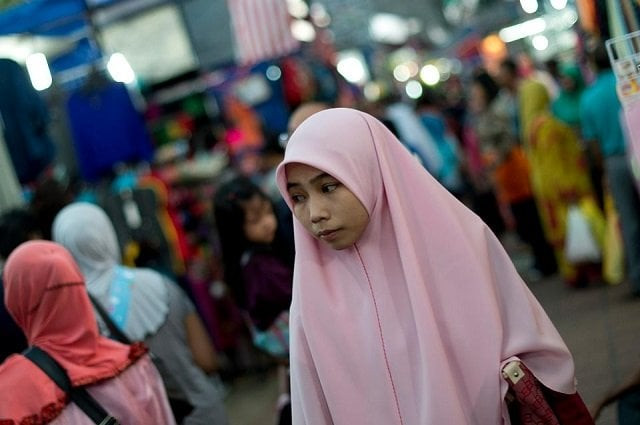High-end hotels in Muslim-majority Malaysia are banning headscarves
Malaysia's opposition party calls silence over headscarf ban a sign of Islamophobia
January 03, 2018
2 min read
Malaysia's opposition party calls the silence over the headscarf ban a sign of Islamophobia. PHOTO: AFP
A number of five-star hotels in Malaysia are disallowing female front desk staff from wearing headscarves, reported Forbes.
While the ban also applies to displays of other religious apparel, a headscarf is the most common thing someone might wear to work in the Muslim-majority country.
The issue first came to light in November after a labour non-profit told Malaysian media that hotel clerks were being told to remove their headscarves.
Muslim denied job in Delhi as hijab made her 'look Muslim from distance of a kilometre'
Concern has been expressed on both a social and political level. “I don’t really think wearing a headscarf is a hindrance to performing front desk jobs, so the ban is curious,” says Oh Ei Sun, a Malaysian-born international studies instructor at Singapore Nanyang University.
Sun also pointed out certain airlines which allows flight attendants to wear headgear which have religious symbolism.
The issue has gained political traction ahead of parliamentary elections in the country. The country's opposition Malaysian Islamic Party claims Muslims are being denied the right to practice Islam in the country according to a report. The report adds that regional leaders of the dominant United Malays National Organisation party have suggested the hotels shut down.
“The objective of a political party would be to frame the issues it purports to champion as the issues which concern most people,” says report author Prashant Waikar, Malaysia Program research analyst at the S Rajaratnam School of International Studies in Singapore.
The headscarf issue is “primarily a reflection of how Malaysian political parties maneuver,” he says.
Hotels, however, seem to be going about business as usual. The ban is international “standard operating procedure” and not discriminatory, Malaysian Association of Hotels chairman Cheah Swee Hee told The Malaysian Insight in November.
Hotels in other countries have similar restrictions on religious apparel too. In May last year, the European Court of Justice (ECJ) ruled that European Union (EU) countries have a legal right to ban “visible religious symbols,” reported Al Jazeera.
Malaysia's opposition party calls the silence over the headscarf ban a sign of Islamophobia.
The country, however, is known for moderate Islam when compared to Muslim countries in the Middle East, such as Saudi Arabia. Malaysia also values its ethnic diversity. Moreover, alcohol is often available at high-end hotels.
Malaysian Muslims don’t rely only on apparel to follow Islam or live only according to their religion, Waikar suggests. "In Malaysia, it is normal to see Muslim women in a headscarf,” he says.
First ever hijab-wearing Barbie unveiled
“It would, therefore, be unsurprising if there were substantial numbers of Muslims who were unhappy about the in-effect headscarf restriction. But to somehow argue that their relationship with Islam is reducible to their attire is nonsensical. Why would one assume that they somehow orientate their lives through Islam and Islam alone?” he added.
This story originally appeared on Forbes

COMMENTS (4)
Comments are moderated and generally will be posted if they are on-topic and not abusive.
For more information, please see our Comments FAQ